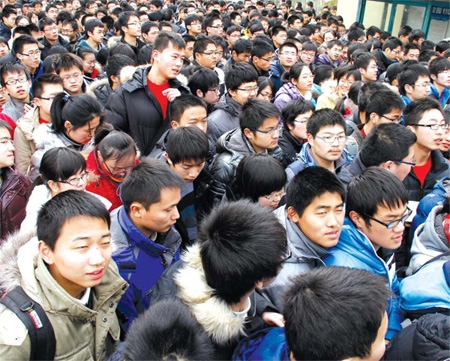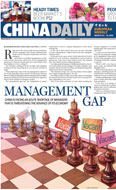Taking the right step forward
Updated: 2011-03-25 10:45
By Xiao Xiangyi (China Daily European Weekly)
|
 Candidates leave an examination area in Nanjing, Jiangsu province, after taking the self-enrollment test jointly held by a group of seven universities headed by Tsinghua on Feb 19, 2011. About 60,000 students took the test in 33 cities around the country. Dong Jinlin / for China Daily |
College admission system reform to make higher education in China 'more diversified'
China has taken the first steps to make its higher education more diversified and further reform its college admission system by encouraging universities to adopt an independent selection criteria that tests students' creativity, imagination and learning skills.
Experts also feel that such a system will help address the chronic talent shortage in China.
For decades, gaokao, the national college entrance examination, was the big hurdle in China that high school graduates needed to surpass for higher education and better incomes. But it had a relatively low success rate despite the large number of applicants every year.
Peking, Fudan and 21 other universities were allowed to conduct separate assessments for student intake as part of a pilot project initiated in 2003. This year, more than 80 universities have decided to utilize the same approach to select nearly 5 percent of the intake.
The "university-based assessment" tests are normally held in February every year, some four months ahead of the gaokao. While some universities have already announced the results for this year, others are expected to follow soon.
|
 |
Though the system does not supersede the gaokao, it is expected to be the yardstick for further education reforms, experts say.
The independent assessments also help the universities better understand the skills of their candidates, rather than depend only on the exam-based gaokao results, they say.
The college self-enrollment exams are made up of two main parts, written exams and interviews. Under the traditional gaokao system, students only have to answer the test paper questions.
But in college self-enrollment tests, they also have to answer the professors' questions face to face.
Students who have cleared Tsinghua University examinations will get a maximum of 60 extra points added on to their gaokao results.
"The bonus points are desirable as it helps students gain admission to the college of their choice. In spite of the stiff competition, I still appreciate the extra chance provided by these universities," says Zhu Modi, a student who has just taken the independent exams of Tsinghua University and Fudan University.
But the independent examinations are not a cakewalk either. In many cases they are more demanding and tougher than the gaokao.
"It's like facing a barrage of tricky questions," says Ni Hao, who recently cleared the self-enrollment examination conducted by Fudan University. The test, dubbed the "1,000-score test", requires candidates to answer some 1,000 questions in three hours.
"Compared to the gaokao, it is fun, but it is also more difficult," Ni says.
"Each university has its own criteria in selecting talent. But at least you can tell that they value active creativity and critical thinking, rather than just exam scores," says Zhang Lijun, mother of a college self-enrollment exam student.
Compared with the six subjects commonly taken for the gaokao, these independent examinations usually test students in more than 10 streams, covering arts and science.
"Unlike the gaokao, you have nothing to review. Nobody knows how to prepare before the test. It's only a warm-up for the gaokao, and hence not that stressful," Zhu says.
Students who pass these self-enrollment exams are more promising and talented than those selected through the gaokao, says Ding Guanghong, director of the student career center at Fudan University.
Self-enrolled students are generally more favored by employers, especially top international companies, shows a survey conducted by Fudan University.
"The four years of follow-up survey showed that these students have higher comprehensive qualities in both academic grades and social competence. This is also in line with the Fudan motto of 'rich in knowledge, tenacious of purpose, inquiring with earnestness and reflecting with self-practice'," says Qin Shaode, Party secretary of Fudan Univerisity.
But not all are convinced and argue that the new system is unfair and elitist.
Under the new system, in some high schools, the students who write these examinations are the ones who are recommended by high-school principals.
"The principals judge the students based on their academic record. Some students who have great potential may still miss the chance," Zhang Lijun says.
"With most of the examinations being conducted in big cities, the travel costs may be unaffordable for some rural students."
According to regulations of the Ministry of Education, the universities can select only 5 percent of their student intake through the self-enrollment exams.
"It involves just 1 percent of all the high school students. Taking the independent exams would be a waste of time for most students who are not that outstanding," says Ge Jianxiong, a professor at Fudan University.
Till last year, the independent assessment examinations for various universities were held in several different cities and on different dates.
To reduce the burden for students, many universities have started to come together and use the same exams from this year onwards.
"It is an inevitable trend for universities' independent enrollment to be united," says Xiong Bingqi, deputy director of the 21st Century Education Research Institute, a Beijing-based non-profit private organization on educational policy research.
Amid all the din about the examination system, there still are several other factors that the education reforms need to focus on and the need of the hour is to generate more talent, say experts.
"The ultimate goal of education is to shape a man with sound personality. A complete and sound personality consists of a sense of social responsibility, pleasant personality, thinking and learning competence, morality and national emotion. We want to reshape the 'high-marks worship' in the traditional gaokao system," says Qin Shaode of Fudan University.
Learning from the successful education experiences of the top colleges in Europe and the United States, many Chinese universities are now trying to set new standards for redefining talent.
"We've absorbed aspects of the higher education system in Western countries in our self-enrollment tests, like the adoption of interviews as an effective way of observing the test-takers. We value the students' overall qualities, such as sense of mission, their way and angle of thinking, outlook, and communication skills. These are what we can gauge from the students through the interviews," Qin says.
Compared to the original gaokao, these self-enrollment tests also emphasize more on traditional culture, especially the students' understanding of Chinese classics.
"Traditional Chinese language and culture is an important aspect on which we test the students. For instance, we see how well they master their own language by asking them to write their own recommendation letters," Qin says.
"We hope to produce talent that can match up to international standards, but at the same time we do not want them to lose their cultural identity in this process," he says.
"The higher education reform will help boost quality-oriented education in high schools," Qin says.
"We hope that the high school principals recommend all-around talent rather than students who score high marks. This is based on our trust of the principals and our recognition of their educational concept."
If the universities are gradually allowed to use their own assessments, the gaokao will become only part of the determinant for institutions of higher learning to enroll students.
E-paper

Taking the right step forward
China has taken the first steps to make its higher education more diversified and further reform its college admission system by encouraging universities to adopt an independent selection criteria that tests students' creativity, imagination and learning skills.
Bombs aim for regime change
CSI, with a twist
Literary path
Specials

Ping-pong Hotel
A ping-pong racket-shaped architecture is planned in East China.

Blasting away floating ice
Bombs are dropped over a section of the Yellow River to blast floating ice.

Beloved polar bear died
Berlin's beloved polar bear Knut, an international star died Saturday.
